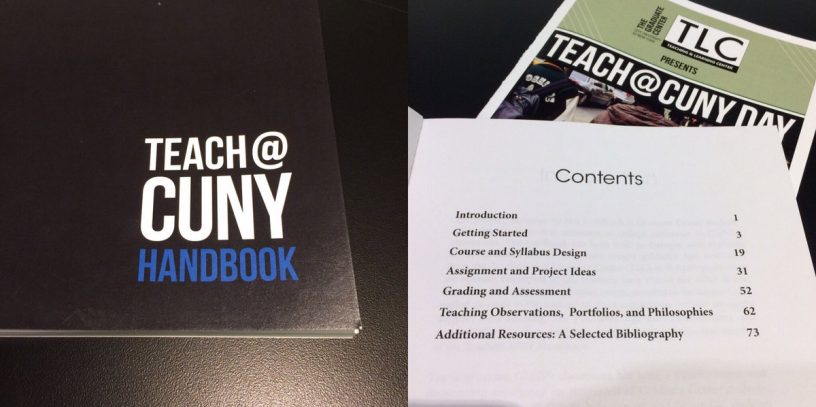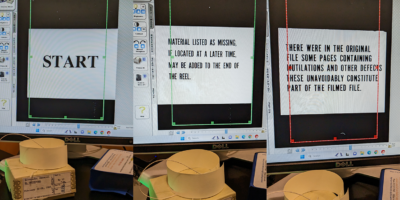By Elizabeth Alsop
On May 8, 2017 Teach@CUNY Day featured two exceptional keynotes, a slate of dynamic workshops, and—it must be said—some excellent schwag. But one of the most memorable moments arrived early in the day, when University Provost Vita C. Rabinowitz, in her opening remarks, shared some reflections on her teaching career at Hunter College. “I loved teaching Intro to Psych,” she told the audience. “I loved being the first person to introduce [my students] to Freud, and Skinner, and Piaget, to theories like cognitive dissonance.” She encouraged Graduate Center students to appreciate the unique pedagogical value of these classes, reminding them that “[a]s the teachers of so many introductory and gateway courses, you get to show them what college-level coursework looks like.”
As an audience member, I was struck by Provost Rabinowitz’s comments—not only because I share her enthusiasm for the intro course, but because she echoed what I suspect are the sometimes unvoiced sentiments of other CUNY instructors. This Spring, for instance, professors Soniya Munshi and Prithi Kanakamedala spoke at a roundtable on community college teaching about the intellectual affordances of introductory classes not just for students, but for faculty. As they suggested, translating a discipline for beginners often pushes instructors to clarify their own thinking, and to find creative ways of making their scholarship relevant to an audience who might initially, at least, have little appetite for it. And of course, research bears out Provost Rabinowitz’s point: that gateway courses have an outsized impact on student learning, and especially their interest and persistence within a field.
Doctoral students are often acculturated to the idea that the most “desirable” classes to teach are the most specialized; as a result, even those who prefer Gen Ed may be reluctant to say so. It makes a difference, then, when faculty and administrators publically celebrate a category of teaching that historically has been among both the most common and the most commonly deprecated within higher education. As we refine our programming at the Teaching and Learning Center, we will continue to to focus on the unique challenges and rewards of the introductory courses so many GC students teach across CUNY.
In fact, if this year’s Teach@CUNY Day had a theme, it was this commitment to valorization: to identifying and affirming classroom practices, forms of knowledge, and pedagogical approaches that have not always enjoyed broad recognition or adoption. At the risk of oversimplifying a day filled with over fifteen workshops, here are three of the “values” I heard affirmed in different contexts:
1. The value of constraints. In their keynote, Maura Smale and Mariana Regolado presented their research on CUNY students’ study habits, which attests to the benefits of constraints, particularly in the context of assignment design. Even students who “hated” being made to complete preliminary steps in a research project, for instance, reported that such scaffolding made all the difference to their project’s outcome (even helping one student overcome a self-described “eighteen-day lazy period” between the paper’s outline and its completion!) Similarly, students found the process of identifying a research topic to be a persistent sticking point—an argument in favor of faculty providing a short-list of options. Their findings served as an important reminder that effective student-centered pedagogy can entail more structure, not less—and that there is such a thing as too much latitude.
2. The value of lived experiences. If Smale and Regolado’s keynote affirmed the importance of students’ lived experiences—their prior knowledge, material circumstances, and personal histories and habits—Natalia Ortiz’s keynote provided a perfect complement: reminding audience members that faculty, too, bring their whole selves into the classroom. “Teaching is holistic,” she noted, describing her own commitment to integrating her identities as teacher, mother, scholar, and activist. “Sometimes we think these roles are separate,” she said, “but in fact they inform each other.”
3. The value of accessibility. In the space of the workshops, several facilitators engaged with the day’s theme of “accessibility” by encouraging participants to challenge their preconceptions about what the term means in a classroom context. In his session on Universal Design for Learning, for instance, Urban Education student Louis Olander argued for thinking about UDL other than in relation to disability, noting that its principles were designed to assist all students—and, in his words, “provid[e] opportunities for success in the form of access.” Similarly, the the leaders of the Tools for Clear Speech program at Baruch emphasized that the session’s goal was not to encourage faculty to “single out” English language learners, but to inform instructors about approaches that could strengthen the engagement of ELL students—and, by extension, maximize inclusivity more generally.
Two months later, this one day remains an energizing reminder of the exceptionally thoughtful and inventive teaching that takes place across CUNY throughout the year. At the TLC, we think of both pedagogy and professional development as collective endeavors built in dialogue with a community. Our goal for next year—as it was throughout our first two years—will be to continue to create multiple, meaningful opportunities for this kind of dialogue: not just at Teach@CUNY Day, but in our in-person workshops; on our digital platform, Visible Pedagogy; through our TLC Grants program and Open Teaching Initiative; through engagement with our brand new Teach@CUNY Handbook and first-ever Teach@CUNY Summer Institute—and, importantly, through the hallway conversations and informal chats we have with GC students and faculty, which can yield the kind of surprising observation or offhand question that inspires a new workshop. We are grateful for this ongoing conversation, and can’t wait to continue it next year.
Video of the morning plenary is below, featuring welcoming remarks from TLC Director Luke Waltzer, Graduate Center President Chase Robinson, and CUNY University Provost Vita Rabinowitz, as well as keynotes from Maura Smale and Mariana Regalado, and Natalia Ortiz.
Elizabeth Alsop is the Assistant Director of the TLC and the Mellon Humanities Scholar of the CUNY Humanities Alliance.









Leave a Reply